Mobile Menu

Lauryn Seering
FFRF wants Mich. city to cancel church service at festival

The Freedom From Religion Foundation is requesting a Michigan city to cancel plans to allow organized Christian worship at a city-sponsored event this coming weekend.
A concerned local resident informed FFRF that Menominee's 35th Annual Waterfront Festival schedule includes an "Outdoor Church Service" at 10 a.m. this Sunday, Aug. 6. The event website says the annual festival is "sponsored by the city of Menominee" and lists the contact as "Menominee City Hall." The festival is also advertised on the city's website with a link to the event page.
FFRF reminds Menominee of its constitutional responsibilities.
"It is a fundamental principle of Establishment Clause jurisprudence that the government cannot in any way promote, advance, or otherwise endorse religion," FFRF Managing Staff Attorney Rebecca Markert writes to Menominee City Attorney Robert J. Jamo. "The Supreme Court has said time and again that the First Amendment 'mandates governmental neutrality between religion and religion, and between religion and nonreligion.'"
The city of Menominee has a constitutional obligation to remain neutral toward religion, FFRF informs the city attorney. By explicitly sponsoring the Annual Waterfront Festival, the city implicitly sponsors each event that occurs at the festival, including the church service. Such sponsorship alienates Menominee residents whose religious beliefs are inconsistent with the message being promoted by the church service, including the 23 percent of American adults — and 35 percent of Millennials — who are nonreligious.
"What about the non-Christian residents of Menominee at the festival?" asks FFRF Co-President Annie Laurie Gaylor. "It'll be more than a tad exclusionary for those folks to endure a Christian ceremony that they won't be a part of at a city-sponsored gala."
FFRF wants the city of Menominee to refrain from scheduling, advertising or otherwise sponsoring a church service at this year's festival and in the future.
The Freedom From Religion Foundation is a national nonprofit organization with more than 29,000 members and chapters across the country, including almost 700 and a chapter in Michigan. Its purpose is to protect the constitutional principle of separation between state and church.
FFRF gets support in unconstitutional N.J. funding case
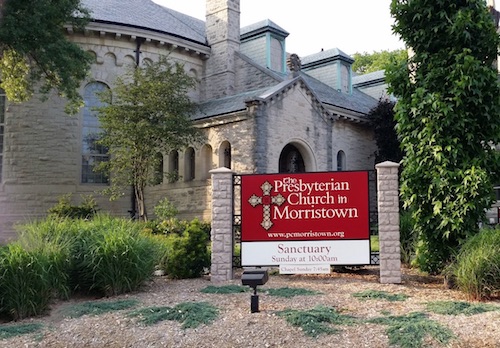
The Freedom From Religion Foundation is grateful for the backing of kindred organizations in a New Jersey case it is fighting against the unconstitutional funding of churches.
Americans United for Separation of Church and State and the American Civil Liberties Union recently submitted an amicus brief in support of a suit that FFRF and member David Steketee filed in state court in late 2015 against Morris County, N.J., challenging major grants of tax dollars to repair or maintain churches. FFRF is specifically objecting to $1.04 million in allotments to Presbyterian Church in Morristown.
FFRF contends the grants clearly violate Article I, Paragraph 3 of the N.J. Constitution that guarantees: "nor shall any person be obliged to pay tithes, taxes, or other rates for building or repairing any church or churches, place or places of worship, or for the maintenance of any minister or ministry, contrary to what he believes to be right." The amicus brief agrees with that contention.
"State constitutional history shows that the Religious Aid Clause was intended to prohibit public funding of religion, and that preventing tax support of buildings used for religious worship was one of its principal aims," the brief says. "History also teaches that the funding at issue here could result in the evils that the Religious Aid Clause was meant to guard against: violation of taxpayers' freedom of conscience; public funding of religion on an extensive scale; weakening of religious institutions through increased dependence on governmental support; governmental interference with churches; and division between religious groups."
The case is currently before the New Jersey Supreme Court, which has accepted a direct appeal of a trial-level decision allowing Morris County to disburse millions in taxpayer funds for church repair, despite the state Constitution provision barring such use.
FFRF is hopeful that the New Jersey Supreme Court will confirm that Morris County cannot compel taxpayers to support or repair churches by upholding the plain language of the state Constitution. With strong national groups rallying to its side, its confidence has received a boost.
"We truly appreciate the support of Americans United and the ACLU," says FFRF Co-President Annie Laurie Gaylor. "The compelling secular arguments we all are making will resonate even more deeply with the New Jersey Supreme Court."
FFRF's lawsuit is being handled by attorney Paul S. Grosswald. FFRF Staff Attorney Andrew L. Seidel and Elaine and Eric Stone Legal Fellow Ryan Jayne are co-counsel. The Freedom From Religion Foundation is a nationwide nonprofit organization dedicated to the constitutional separation of state and church, with more than 29,000 nonreligious members across the country, including 500-plus in New Jersey.
Wisc. school agrees to turn off Christian radio

The Freedom From Religion Foundation is commending a Wisconsin school district for turning off a Christian broadcasting station on a school bus.
Early in spring, FFRF sent a letter to the Stevens Point Area Public School District due to concerns over a bus driver who was incessantly playing devotional Christian music on a bus taking students to P.J. Jacobs Junior High School.
"The Stevens Point Area Public School District must ensure that religious broadcasts are not being played to students utilizing district transportation," wrote FFRF Legal Fellow Ryan D. Jayne. "Public school bus drivers are agents of the school district and are subject to the same constitutional restrictions as other district staff, including the Establishment Clause of the First Amendment."
This means that religious messages — such as Christian music — may not be promoted by district employees because it equates to an impermissible school sponsorship of a specific religion. Moreover, this kind of broadcasting alienates non-Christian students and families. Nearly 30 percent of Americans are non-Christians, either practicing a minority religion or no religion at all, including almost 45 percent of Millennials.
After highlighting this constitutional misstep, Jayne requested that the district inform its bus drivers that religious programming may not be played while students are present. The school district responded earlier this week with a brief, but laudable, response: "The practice has ceased."
"A captive audience of public school children should never be forcibly exposed to programming of an evangelizing nature," says FFRF Co-President Annie Laurie Gaylor. "The school district was right to end this disturbing practice."
The Freedom From Religion Foundation is a Wisconsin-based national nonprofit organization with more than 29,000 members and chapters across the country, including more than 1,400 members in Wisconsin and the Kenosha Racine Atheists & Freethinkers chapter. It's purpose is to protect the constitutional principle of separation between state and church.
Photo by Stuart Monk via Shutterstock
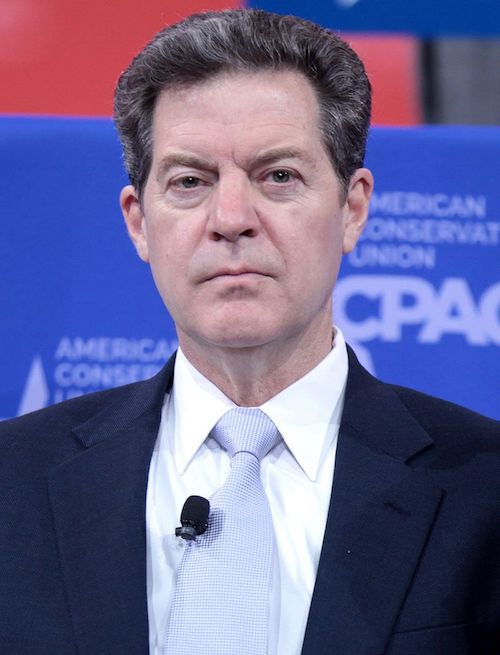 President Trump's latest appointee is as dreadful as his earlier ones.
President Trump's latest appointee is as dreadful as his earlier ones.
Trump has nominated Kansas Gov. Sam Brownback as an ambassador-at-large for religious freedom. Trump has chosen several other religious zealots for contradictory and preposterous posts, like asking foxes to guard the henhouse, as FFRF has observed on other occasions. Brownback's views are similarly antithetical to the office for which he will be nominated.
Brownback has a distorted view of religious freedom — more akin to religious privilege. He has used his power as governor to weaponize religious freedom, changing it from a hallowed protection of the rights of individual conscience into a tool to impose religious beliefs.
FFRF has a long history of opposing the Kansas governor. His views on religious freedom, which he'll be responsible for in his new post, are truly troubling.
Under the guise of "religious freedom," Brownback legitimized discrimination by signing SB 175, "the Campus Religious Freedom Bill," which prevents state universities from taking any action against student groups that discriminate against minorities if their religion declares it necessary. This runs up against settled Supreme Court precedent.
As a senator in 2010, Brownback joined a brief against FFRF's lawsuit that, for a time, struck down the National Day of Prayer. When the 9th Circuit declared that "under God" in the Pledge of Allegiance was unconstitutional, Brownback took to the floor of the Senate to excoriate the appeals court: "Can we declare the Constitution unconstitutional?" Apparently, he forgot that the Constitution, like the original pledge, is godless.
Brownback stood by Texas Gov. Rick Perry's side when Perry used his position in 2011 to organize and promote a massive prayer rally in an effort to solve the worst statewide drought ever. Brownback was the only other governor to attend the prayer rally. And after all of Perry and Brownback's prayers, the drought worsened.
One of the worst breaches by Brownback came in 2012 when he proclaimed Dec. 8 as the "Day of Restoration in Kansas." In his official capacity as Kansas governor, he appeared in a commercial for a private religious group, ReignDown USA. He beseeched people to ask for "humility to be used as salt and light in a difficult season for the United States and for our state." The reference to salt and light invokes Matthew 5:13-16, a passage, like ReignDown's mission, that is about converting people to Christianity.
In 2015, FFRF hammered Brownback for an executive order issued in the wake of the Supreme Court's ruling on marriage equality, seeking to "preserve and protect" religion. The third part said that the state government "shall not take any discriminatory action against a religious organization that provides social services or charitable services, which acts or intends to act upon sincerely held religious belief or moral conviction." This was directed at religious adoption agencies and similar organizations. Also in the aftermath of the Supreme Court judgment, Brownback removed discrimination protections for LGBT state employees with an executive order.
Just a few months ago, FFRF took Brownback to task for his sermonizing state of the state address. He concluded by saying that Kansas "is the place our destiny lies. A place sung of in countless churches, synagogues, and places of worship across our vast prairie. ... Let us never forget the God of our forefathers who blessed it and us. And let our eyes never lose sight of the glow from that heavenly place where peace reigns forevermore! May God continue to bless the people of our home — Kansas."
Kansas will get rid of an awful governor if Brownback is confirmed as ambassador, but the State Department will receive the unwelcome gift of an unfit diplomat.
(FFRF intends to give the information in this statement and sample questions to the Senate Foreign Relations Committee, which will handle Brownback's confirmation.)
FFRF alarmed about Ky. elementary school bible classes

The Freedom From Religion Foundation (FFRF) is deeply troubled about elementary school bible classes being taught in a Kentucky school district.
A concerned local parent informed FFRF that the Knox County Public Schools system teaches elementary students bible classes. The district reportedly sends letters to parents at the start of each school year promoting the Bible Based Character Education classes and a permission form for parents to opt out of the classes. These classes are given in place of physical education or library time two days a month. Students who do not participate sit in the library.
The class constitutes illegal religious instruction and is geared towards the district's youngest, most impressionable students, FFRF contends. FFRF has never heard of, and seriously doubts there could be, a class objectively teaching about the bible to elementary school students. The classes appear to be nothing more than a Sunday School course.
These classes are flagrantly unconstitutional, FFRF warns the school district. FFRF filed suit earlier this year challenging similar bible instruction in elementary schools in West Virginia.
"In the seminal Supreme Court case on this issue, McCollum v. Bd. of Educ. (1948), the court held that bible classes in public school were unconstitutional," FFRF Senior Counsel Patrick Elliott writes to Knox County Public Schools Superintendent Kelly Sprinkles. "The court did not find it relevant that parents had to opt their children in to the religious instruction, because the classes themselves still constituted an illegal use of the school system for a religious purpose. The facts here could hardly be more similar." Other federal courts have ruled that similar courses are unconstitutional. For instance, in FFRF's successful lawsuit against religious instruction in Rhea County, Tenn., some years ago, the court said, "This is not a close case. Since 1948, it has been very clear that the First Amendment does not permit the state to use its public school system to 'aid any or all religious faiths or sects in the dissemination of their doctrines.'"
And suggesting that children who do not wish to be subjected to religious activity at their school should be segregated from their classmates is reprehensible. It shames students into either outing themselves as different or showing deference to a religion they do not believe in and to which their parents do not want them subjected.
These classes are also a usurpation of parental authority — parents have the right to direct the religious, or nonreligious, upbringing of their children, not public schools. These bible classes alienate those students, parents, teachers and members of the public whose religious beliefs are inconsistent with the religious messages being promoted by the school, even other Christians whose beliefs do not endorse the biblical interpretation that the school teaches.
Parents and taxpayers expect and desire a secular education. It makes no difference if some parents would like the school system to teach the bible as fact to its students. The law is clear: The teaching of religious doctrine is prohibited in public schools under the Constitution. Not only is this constitutionally required, it reflects the increasingly pluralistic world we live in.
FFRF insists that Knox County Public Schools put an immediate moratorium on elementary school bible classes and investigate its bible classes at all grade levels.
"We're talking about children here," says FFRF Co-President Annie Laurie Gaylor. "It's unconscionable to subject them to religious indoctrination."
The Freedom From Religion Foundation is a national nonprofit organization with more than 29,000 members and chapters across the country, including members and a chapter in Kentucky. FFRF's purpose is to protect the constitutional principle of separation between state and church, and to educate the public on matters relating to nontheism.
Photo via Shutterstock by Christin Lola
Evangelical group abuses school access in Wisconsin
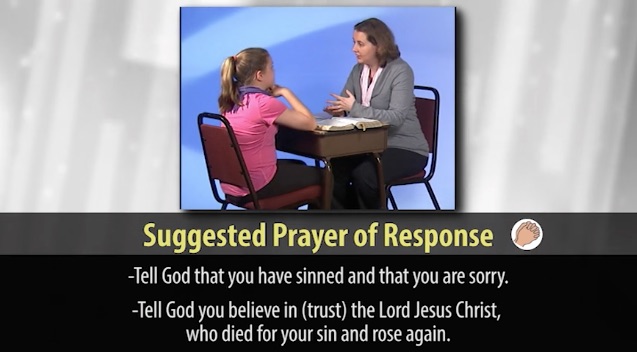
A dubious evangelical group that seeks out children is outrageously misusing school privileges to spread its doctrine at an elementary school in Wisconsin.
The Child Evangelism Fellowship, operator of 5-Day Clubs and Good News Clubs across the country, launched its two-week evangelical invasion of Milwaukee-area public schools last week. FFRF has already cautioned area parents about the organization's tactics. Now, FFRF has learned that club organizers have abused their access to public school property in order to evangelize Wisconsin elementary school students against their parents' wishes.
Just a few days after it sent a letter of concern to Racine Unified School District over potential interference by a 5-Day Club with an elementary school's summer program, FFRF has come to know that club organizers entered into summer school classes, in violation of their agreement with the school district, in order to evangelize and coax kids to participate in club activities.
"Because the 5-Day Club at Schulte Elementary operated at the same time as the summer program, club organizers were essentially asking students to abandon their summer school and join an evangelical mission," notes FFRF Staff Attorney Sam Grover. "This behavior is reprehensible and raises constitutional issues for the school district."
Public school districts have an obligation to ensure that the students in its charge are not exposed to religious messaging from outside adults with an interest in preying on impressionable young minds. Racine Unified School District took steps to ensure that advertisements by the 5-Day Club included a disclaimer of school endorsement. But because club organizers were mistakenly allowed into classrooms to advertise their evangelical agenda during the school day, no disclaimer can overcome the appearance that the district endorses the club's religious message.
For its part, the Racine school district appears to have done its best to abide by its constitutional obligations, notes Grover. The district acknowledged the concerns raised in FFRF's letter, but relied on assurances from 5-Day Club organizers that summer school students would not be exposed to the 5-Day Club and its evangelical message. The district was told that the 5-Day Club would meet exclusively on the playground, start after students were already inside for summer school, and conclude before students were let out. The club's low attendance numbers the past Monday may have prompted organizers to circumvent district administrators and enter summer school classrooms to evangelize.
"It is clear that 5-Day Clubs, like Good News Clubs, do not respect the authority of the public schools they rent, or the Constitution those public schools must follow," says FFRF Legal Fellow Chris Line. "They believe they answer to a higher power that wants them to reach young children, even if it means deceiving school officials and putting school districts in violation of the law."
While these 5-Day Clubs will only be around until the end of the week, the Child Evangelism Fellowship intends for them to be the seed for the newly established Good News Clubs that will remain in Milwaukee area school districts during the school year. FFRF urges area parents to continue to monitor their children's schools in order to bring future abuses to the attention of school administrators.
The Child Evangelism Fellowship's inexcusable tactics shouldn't be permitted.
FFRF urges close scrutiny of appeals court nominee
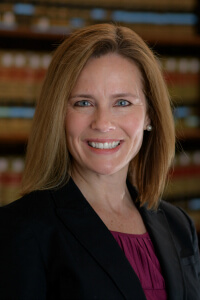 The Freedom From Religion Foundation has strong reservations about an appeals court nominee's fitness for the judgeship.
The Freedom From Religion Foundation has strong reservations about an appeals court nominee's fitness for the judgeship.
In a number of questions it proposes to Senate Judiciary Committee Chair Chuck Grassley, FFRF expresses its concerns about Notre Dame law professor Amy Coney Barrett, whom President Trump has nominated for the 7th U.S. Circuit Court of Appeals. The 7th Circuit handles appeals from Illinois, Indiana and Wisconsin, FFRF's home state of operation.
In its questions, FFRF focuses on public stances Barrett has taken that place her at odds with the secular nature of the U.S. Constitution. Barrett has repeatedly expressed the view that her Catholic faith may trump her secular duties as a judge.
For instance, Barrett has stated her disagreement with Supreme Court Justice William Brennan's comments during his 1957 confirmation hearings that the Constitution takes precedence when in conflict with personal religious beliefs. Barrett has criticized this exemplary stance, writing that she does "not defend this position as the proper response for a Catholic judge to take with respect to abortion or the death penalty."
In 2015, Barrett signed a letter from "Catholic women" to the "Synod Fathers in Christ," in which she expressed her "fidelity to and gratitude for the doctrines of the Catholic Church." The letter expressed her views on a number of topics that will surely come before the 7th Circuit: "We give witness that the Church's teachings — on the dignity of the human person and the value of human life from conception to natural death; on the meaning of human sexuality, the significance of sexual difference and the complementarity of men and women; on openness to life and the gift of motherhood; and on marriage and family founded on the indissoluble commitment of a man and a woman — provide a sure guide to the Christian life, promote women's flourishing, and serve to protect the poor and most vulnerable among us."
Barrett's views on such debated notions as the constitutional wall of separation between church and "religious liberty" are likely to be problematic, as well. In fact, she has already expressed some approval of the latter notion, which in practice means the license to discriminate based in religion. FFRF has pointed questions for Barrett on these and related topics. It also asks her view of the 2014 Supreme Court 2014 decision in Burwell v. Hobby Lobby establishing for the first time that within the meaning of the Religious Freedom Restoration Act, a "person" includes a for-profit corporation.
"Barrett's record and stated positions will clearly affect the concerns of the growing number of Americans who identify as secular or nonreligious, today approaching nearly a quarter of the population," FFRF Co-Presidents Dan Barker and Annie Laurie Gaylor state in their letter. Almost one-fourth of Americans now identify as nonreligious. That 8-point increase since 2007 and 15-point jump since 1990 makes the "Nones" the fastest growing identification in America. Nationally, about 35 percent of Millennials are nonreligious.
FFRF does not advocate for a religious test for public office. Its objection is not to Barrett's Catholicism, but to her expressed unwillingness to side with our Constitution when it conflicts with her personal religious beliefs. Giving Barrett's judicial outlook, a place on the 7th Circuit could have far-reaching impacts on important issues such as a woman's right to choose, the right to die, the death penalty, and the collision of Catholic health care and our secular law.
If Barrett truly believes her Catholic dogma dictates her behavior, she should recuse herself in cases involving not only abortion and the death penalty, but on all other issues her religion demands, including gay marriage, transgender rights, euthanasia, and the furtherance of her church's evangelical mission. Better yet, let's put someone on the bench who can approach all cases with a clear head and unmuddled conscience.
The Freedom From Religion Foundation is a nationwide nonprofit organization representing more than 29,000 members across the country, including members in every state. Its purposes are to protect the constitutional principle of separation between religion and government, and to educate the public about nontheism.
Reserve rooms now for FFRF fun-filled annual convention

The Freedom From Religion Foundation urges all members to book their hotel rooms for its fun-filled annual convention in Wisconsin's scenic capital Come September.
The Sept. 15-17 gala event at the Frank Lloyd Wright-designed Monona Terrace in downtown Madison, Wis., will include speeches and entertainment by illustrious personalities and a tour of FFRF's Freethought Hall headquarters. Reserve your rooms now at the special convention rate of $183 before they're sold out. The rooms are going fast, and the deadline for booking at the discounted rate is Aug. 14.
Actress and comedian Julia Sweeney will be the Saturday evening keynote speaker. Sweeney, who rounds out a complete weekend lineup of performers and speakers, is perhaps best known as a member of the "Saturday Night Live" cast from 1990-94.
With so many great speakers set for this year's convention, the Friday schedule will begin at 3 p.m., earlier than the start of previous FFRF conventions. FFRF Honorary Board President Steven Pinker and Katha Pollitt will both speak prior to the "Forward" Tailgate Dinner, after 13-year-old Kelly Helton gives a five-minute student activist pep talk.
After the break, FFRF Co-Presidents Annie Laurie Gaylor and Dan Barker will give the welcoming remarks, to be followed by Maryam Namazie, who will receive the Henry K. Zumach Freedom From Fundamentalism Award. Comedian Paula Poundstone will conclude Friday's events with her performance.
Saturday's schedule is just as exciting, and just as packed. You'll get to hear from FFRF's legal staff members regarding many of the major cases they worked on during the year. That will be followed by four freethinkers of the year presentations, activist Kimberly Veal, composer Brent Michael Davids, science communicator Cara Santa Maria, author and columnist Michelle Goldberg and singer-songwriter Roy Zimmerman. Sweeney will conclude the night with her remarks.
We'll be hosting a pre-convention open house tour of FFRF's stunning Freethought Hall, in downtown Madison just blocks from the convention site, from 9:30 a.m. to noon on Friday, Sept. 15. We welcome you to mingle with others, chat with our staff, and visit FFRF's monument to Atheists in Foxholes (military and veterans). You can also stop by the charming Freethought Library to snap a souvenir photo with our life-size mannequin of Charles Darwin. Enjoy complimentary locally made pastries, coffee, tea, and Mimosas or Champagne in the sunny fourth-floor auditorium featuring an exquisite grand piano.
Friday evening, between program sessions, join us at the first-ever, Wisconsin-style FFRF Tailgate Party, held on the Rooftop Garden at Monona Terrace. Music from Madison's own Forward! Marching Band will liven the atmosphere. Grab your tailgate dinner and, if the Wisconsin spirit moves you, a traditional brandy old-fashioned at the cash bar. Then join in a game of bean bags, and meet some new secular friends.
Other annual events will include the Saturday "Non-Prayer Breakfast," the yearly drawing for "clean," pre-"In God We Trust" currency, and the opportunity to browse FFRF book and sales tables.
Join us in all the fun and revelry! Reserve your spot at the convention — and your room at the hotel — now.
University of Mississippi's head football coach, Hugh Freeze was forced to resign Thursday night after an investigation by school officials revealed a "pattern" of phone calls from the coach to a female escort service. The Freedom From Religion Foundation is unsurprised to learn that Freeze — a man known for pushing his personal religious beliefs onto his players and using his public position to promote his faith — has revealed the hypocrisy in his conduct.
In a Thursday night news conference, Ole Miss athletics director Ross Bjork stated that if Freeze had not resigned, the school would have "exercised the termination clause in the contract for moral turpitude." Chancellor Jeffrey Vitter described the Coach Freeze scandal as "a pattern of personal conduct inconsistent with the standard of expectations for the leader of our football team." But Freeze's conduct is surprisingly consistent with the pattern of public officials who shroud themselves in religious rhetoric while asking that we do as they say, not as they do.
FFRF exposed Hugh Freeze's state-supported evangelical mission in its 2015 "Pray to Play" report. The report outlined, among other things, Freeze's efforts to fundraise for a team chaplain, stating in part, "We have coaches that are men of integrity, character and faith to work with these young men to build a strong foundation that will lead to excellence on the field . . ." The report also calls out Freeze for using expressions of faith as a recruiting tool.
Less than four months ago, FFRF sent a letter of complaint to the University of Mississippi arguing that as a state-run entity, its football program should not be promoting the personal religious beliefs of its coaches. Freeze is well known for posting religious messages on his Twitter account.

The letter explained, "Though we respect Freeze's right to tweet as a private citizen, he may not promote his personal religious beliefs while acting in his capacity as a University employee." FFRF attorney Sam Grover asked that the university refrain from posting Freeze's religious messages on its official football webpage. Ole Miss declined to take action. Though FFRF expects that the problem has now resolved itself with respect to Freeze, the university may still be liable for promoting similar religious statements from other football coaches.
Freeze is not the first evangelical Christian football coach at a public university to claim piety while engaging in bad behavior. Clemson's coach Dabo Swinney made headlines in January after it was revealed that his players were intentionally grabbing the genitals of opposing players and hurling racial slurs at them on the field. Swinney, who regularly emphasizes his religious beliefs to players and prospects, shrugged off what could amount to sexual assault as "goofy" and "silly." This questionable reaction underscores the shortcoming and hypocrisy of using faith as a teaching tool when a coach is unwilling to live up to his own standards.
The Kentucky Tourism, Arts, and Heritage Cabinet notified the operators of the Ark Encounter that it is in breach of its Tourism Development Agreement with the state. That agreement provides up to $18 million in state subsidies for the Ark project in the form of annual sales tax rebates. FFRF obtained records from the Cabinet today that include a July 18 notice sent to the operators of the Ark saying that Ark Encounter, LLC has breached the agreement following the sale of the property. The letter says that no further tax rebates may accrue as of June 28.
The letter is similar to a letter sent by FFRF this week to the Cabinet Secretary, which pointed out that the Cabinet is prohibited from paying out further sales tax rebates without new authorization.
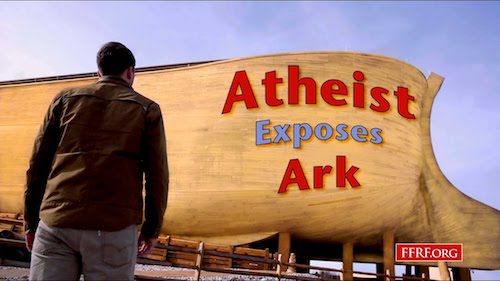
The Freedom From Religion Foundation is condemning a questionable sale of the creationist Kentucky ark park and is calling upon the state to rescind its sales tax subsidies.
The Ark Encounter — the Noah's Ark-themed park that creationist Ken Ham operates — reportedly sold its main $48 million parcel and Ark attraction on June 28 for $10 to Crosswater Canyon, a nonprofit ministry. The Kentucky Tourism Development Finance Authority had previously approved the theme park for sales tax rebates. The sale seems to be a maneuver by the operators of the Ark to avoid paying state and local property taxes. Ark managers appear to have made the move as retaliation against the city of Williamstown for adopting a 50 cents safety fee on ticket sales that would fund emergency services.
Given the significant public subsidies that have gone to this attraction, it is alarming that Ark executives are playing games with the ownership of the property. The change in ownership does not allow for continued sales tax rebates without new authorization from Kentucky governmental entities, FFRF contends.
While Ark Encounter is an approved company, FFRF has found no evidence that the Kentucky Tourism Development Finance Authority approved Crosswater Canyon. Kentucky law explicitly limits the transfer of tax rebates to a new company without the approval of the Authority.
"We are unaware of any notice provided to the Authority and any resolution that the Authority has passed approving of payments to the new owner of the Ark," FFRF Senior Counsel Patrick Elliott writes to Kentucky Tourism, Arts and Heritage Secretary Don Parkinson. "The agendas from recent Authority meetings do not include a discussion of the Ark Encounter."
If such a request does come before the Kentucky Tourism Development Finance Authority, the transfer should be denied because the change in ownership is detrimental to the Commonwealth of Kentucky, FFRF asserts. Selling the attraction for a nominal amount to avoid taxes that are owed to the state and local community is not a bona fide justification that the Authority should accept.
"It is highly immoral for an entity supposedly founded on morality to engage in behavior like this," says FFRF Co-President Dan Barker. "But perhaps the fire sale of $10 reflects the true worth of the park."
FFRF is requesting that the Kentucky Tourism Development Finance Authority take immediate action to suspend the availability of tax rebates to the operators of the Ark and to terminate any applicable agreements it has with the Ark Encounter.
The Freedom From Religion Foundation is a national nonprofit organization with more than 29,000 members and chapters across the country, including members in Kentucky and an FFRF Kentucky chapter. Its purpose is to protect the constitutional principle of separation between state and church and to educate the public on matters relating to nontheism.
FFRF halts Ohio County’s plan to finance religion

The Freedom From Religion Foundation has stopped an Ohio county's attempt to divert public dollars into exclusively religious organizations.
Earlier this month, it was brought to FFRF's attention that Cuyahoga County had issued a "request for proposal" so that it could offer outreach services limited to faith-based organizations or coalitions of faith-based organizations. The request was intended to seek "proposals from faith-based organizations interested in providing outreach and referral activities to drive enrollment in Cuyahoga County's Universal Pre-Kindergarten Program."
The single explanation for why the request was limited to spiritual organizations was a blatant government show of favoritism toward religion: "Faith-based organizations hold a special place in the community as a known and trusted resource." Faith-based organizations are defined in the request as "currently designated tax-exempt churches, synagogues, mosques, temples or other religious organizations under the authority of the IRS as outlined in IRS code section 501(c)3."
In a letter to the county administration, FFRF warned against such an explicit violation of the Supreme Court's recognition of the First Amendment's mandate that the government must remain neutral between religions and between religion and nonreligion.
"While the county's goal of introducing more children to its high-quality preschool program is laudable, it is inappropriate for the county to offer an opportunity for public funding exclusively to religious organizations," wrote FFRF Legal Fellow Chris Line. "A county-sponsored program available only to religious organizations fails to respect either constitutional mandate of neutrality."
In a commendable display of reason, the county responded that it would comply with constitutional requirements to be entirely neutral on matters of religion.
The Director of Law for the county, Robert Triozzi, called to inform FFRF that the "request for proposal" has been withdrawn due to the constitutional issues that were raised and will be reissued without a faith-based requirement.
FFRF salutes Cuyahoga County for altering the biased proposal and making the community a more inclusive place for nonbelievers, who make up almost one-quarter of Americans.
"Religion is divisive, and it is commendable that county officials have recognized that the whole community benefits when it is expunged from a public proposal," says FFRF Co-President Annie Laurie Gaylor. "Now all county taxpayers might benefit from the proposed outreach services, which is wonderful news."
The Freedom From Religion Foundation is a national nonprofit with more than 29,000 members nationwide, including more than 700 members in Ohio and a local chapter in Cleveland. FFRF's purposes are to protect the constitutional principle of separation between state and church, and to educate the public on matters relating to nontheism.
Photo Source: Anthony Heflin / Shutterstock
FFRF spotlights taxpayer-subsidized NYC religious entity
 The Freedom From Religion Foundation is shining a spotlight on an apparent case of a taxpayer-subsidized religious organization in New York City.
The Freedom From Religion Foundation is shining a spotlight on an apparent case of a taxpayer-subsidized religious organization in New York City.
A concerned New York taxpayer contacted FFRF to report that the New York Quarterly Meeting of the Religious Society of Friends, a New York religious nonprofit, received government funds to expand its secular private school, Friends Seminary. The organization had signed contracts for those funds promising not to use any proceeds from the funds to advance religion. But the New York Quarterly Meeting and the Friends Seminary split into two separate entities in 2015, and, according to documents received by FFRF, the religious organization is now charging the school $775,000/year in order to use the new expansion — money that FFRF understands is being used to further the church's religious mission.
"This arrangement appears to violate both the New York Quaker Meeting's loan agreements and the Establishment Clause," states FFRF Legal Fellow Ryan Jayne. "In effect, it appears that the New York Quaker Meeting is using taxpayer-subsidized property as a source of church income."
FFRF is writing to the two entities that have made bond agreements with the New York Quarterly Meeting — the NYC Industrial Agency and the Phoenix Industrial Development Authority — and to the Charities Bureau of the New York State Attorney General's Office. It is requesting the first two entities enforce their contracts by requiring the New York Quarterly Meeting to stop using proceeds of the bond funds for religious purposes, and FFRF is asking the Attorney General Office to investigate.
As the NYC Industrial Agency and Phoenix Industrial Development Authority are both aware, providing discretionary funds to the New York Quarterly Meeting that are used to advance its religious mission would violate the Establishment Clause of the First Amendment, FFRF adds. Government officials have an affirmative obligation to ensure that government funds are not used to advance religion.
"An organization cannot arbitrarily violate the terms of agreement under which it received public subsidies," says FFRF Co-President Dan Barker. "Taxpayers of different creeds — and no creed — shouldn't be forced into subsidizing the religious activities of a sectarian church."
The Freedom From Religion Foundation is a national nonprofit organization with more than 29,000 members across the country, including 1,500-plus in New York. FFRF's purposes are to protect the constitutional principle of separation between state and church and to educate the public on matters relating to nontheism.
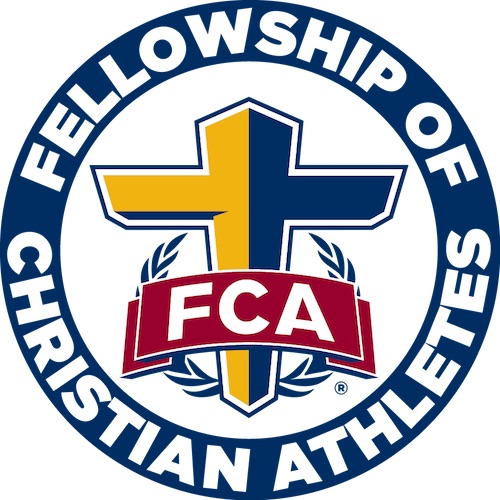 The Freedom From Religion Foundation has made certain that a Wisconsin school district's employees will not take part in a student religious organization.
The Freedom From Religion Foundation has made certain that a Wisconsin school district's employees will not take part in a student religious organization.
A concerned member contacted FFRF to report that the School District of Onalaska's employees were participating in the student religious club Fellowship of Christian Athletes at Onalaska High School. Local media reported that Josh Lichty, freshmen football coach and fifth-grade teacher at Northern Hills Elementary, and high school teacher Amanda Steele "participated in the discussions" about prayer with students at a club meeting in Steele's classroom. Lichty reportedly asked students "how and why they prayed," and counseled them that "a big step is praying before an event with your team. Then you as a team are playing for something bigger than a 'W'. What you are doing is showing His light everywhere." Lichty went on to recommend that students pray in the morning rather than getting extra sleep.
It is unconstitutional for district employees to participate in student religious clubs, even if those clubs meet during noninstructional time, FFRF reminded the district.
"It is well settled that public schools may not advance, prefer, or promote religion," FFRF Legal Fellow Ryan Jayne wrote to district Superintendent Fran Finco. "Students are permitted to form religious clubs, but the district may not endorse, or appear to endorse, those clubs."
To avoid the appearance of endorsing a religious club, the district may not allow teachers or outside adults to be involved in student religious clubs beyond a supervisory capacity, FFRF emphasized. Courts have maintained that "the preservation and transmission of religious beliefs and worship is a responsibility and a choice committed to the private sphere." When Lichty and Steele participated in Fellowship of Christian Athletes meetings, they impermissibly appeared to endorse the religious club on behalf of the district.
FFRF asked for assurances that district staff would not organize or participate in any religious student clubs and requested that the club be assigned a new faculty sponsor.
FFRF's missive compelled the district to engage in a course correction.
The school district's attorney, Kirk Strang, called FFRF to say that the district has taken "curative action" by removing Lichty and Steele from their roles in the Fellowship of Christian Athletes and instructing the club's new faculty advisors that they may not participate in the club.
FFRF is pleased that its intervention made a difference.
"We're delighted that due to us, the School District of Onalaska is now adhering to the Constitution," says FFRF Co-President Annie Laurie Gaylor. "We're always glad to alert officials to such violations."
This is FFRF's second victory in Onalaska this year. Earlier, the constitutional watchdog got a huge prayer display removed from a police station there.
The Freedom From Religion Foundation is a Madison-based national nonprofit organization that works to protect the constitutional principle of separation between state and church. It represents more than 29,000 members had has chapters across the country, including 1,200-plus and a chapter in Wisconsin.
FFRF cautions Milwaukee about evangelical “blitz”
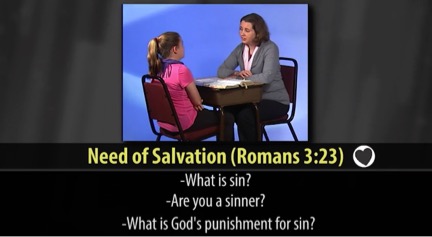
The Freedom From Religion Foundation is warning Milwaukee parents about an evangelical offensive.
The freethought organization is partnering with Protect Our Children and Southeast Wisconsin Freethinkers to alert parents and community members that a two-week invasion of evangelical missionaries targeting children is beginning in the greater Milwaukee area.
Each summer, Good News Across America, a national children's outreach sponsored by Child Evangelism Fellowship, targets the children of a different U.S. city for evangelism. In the past, the Fellowship has sent missionaries specially trained to evangelize children to Chicago, the Twin Cities, and Indianapolis. This summer, it is descending on Milwaukee.
The Child Evangelism Fellowship will lead local churches in recruiting children as young as 5 years old to join its 5-Day Clubs. It only partners with fundamentalist "bible-believing" churches (mainstream Christian churches like Episcopalians or Presbyterians are not welcome). These local churches pay a fee to the Fellowship for training and materials, agree to use its teaching materials exclusively, and sign onto its 15-point Statement of Faith (with beliefs like biblical inerrancy, salvation not by good deeds but by faith alone, and the damnation of unbelievers to the Lake of Fire for conscious, eternal torture). In exchange, the Child Evangelism Fellowship offers local churches the opportunity to recruit "unchurched" elementary school children and their parents.
The 5-day Clubs, which pop up in "parks, community centers, day cares, apartment complexes, wherever children gather" use "fun games, tasty snacks, and cool prizes," quoting from the Fellowship's online materials, to entice children into a fundamentalist Christian bible study. They are shamed for being sinners, then expected to memorize bible verses, listen to bible and missionary stories and begin evangelizing their friends and family.
FFRF and other groups, such as Protect Our Children, are deeply concerned about the deceptive, controversial tactics that the Fellowship uses to lure children to both its 5-Day Clubs and Good News Clubs. These clubs give the impression that they are operated by local churches and staffed by caring volunteers, but local churches are not free to teach what they wish. They are trained by the Child Evangelism Fellowship and required to use its curriculum.
These 5-Day Clubs, like the Good News Clubs, emphasize sin and the fact that children are sinners. The clubs shame and frighten children by telling them they're bad, they're sinners, and that they don't deserve God's love. The clubs claim the only way to escape the terrible punishment they deserve is to believe what the club tells them and to do what the club tells them to do.
FFRF encourages local citizens to observe and document the activities of 5-Day Clubs that spring up in their community, so parents are not deceived about the clubs' true nature and purpose.
You can find out more about the Child Evangelism Fellowship at the Protect Our Children website.
The Freedom From Religion Foundation is a Wisconsin-based national nonprofit organization with more than 29,000 nonreligious members across the country, including 1,200-plus in Wisconsin. Its purpose is to protect the constitutional principle of separation between state and church.